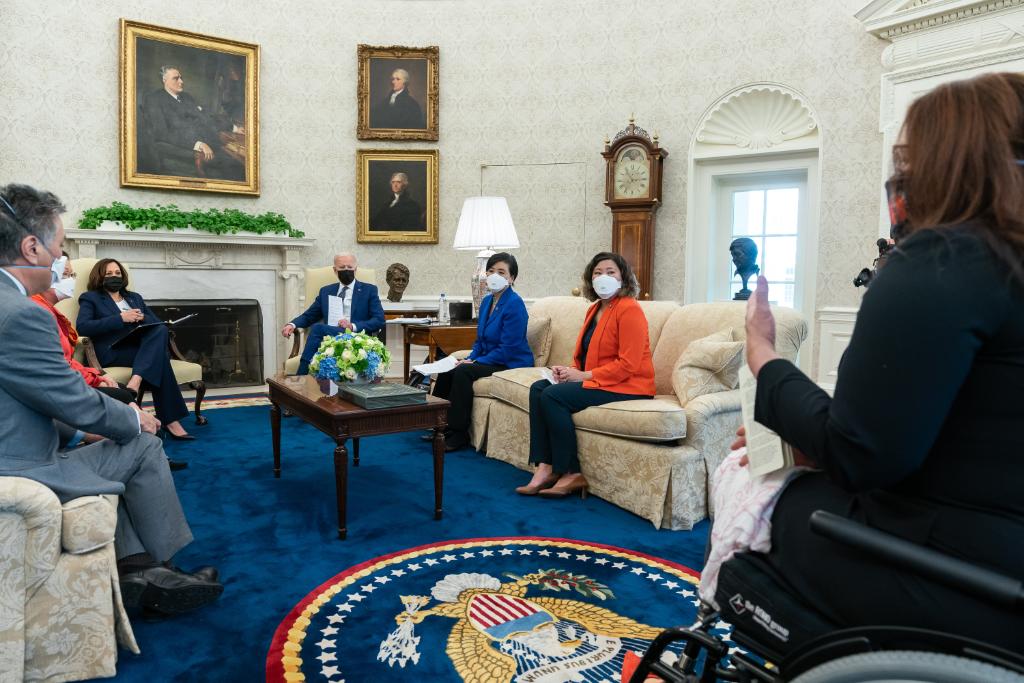
PRESIDENT Joe Biden and Vice President Kamala Harris met with members of the Congressional Asian Pacific American Caucus on Thursday, April 15 in the wake of recent anti-Asian attacks and other issues facing the community during the pandemic.
The meeting at the White House came nearly a month after shootings at three Atlanta-area spas that left eight individuals, including six women of Asian descent, dead.
It also occurred a day following the U.S. Senate’s vote to advance legislation that would address hate crime reporting and create a position within the Department of Justice to expedite the review of such cases.
The COVID-19 Hate Crimes Act, introduced by Rep. Grace Meng (D-N.Y.) and Sen. Mazie Hirono (D-Hawaii), received bipartisan support in the Senate on Wednesday, April 14 with 92 votes in favor of opening debate on the bill.
Biden said he and Harris were “heartened by the Senate’s overwhelming bipartisan effort” to advance the bill. He had publicly thrown his support behind the legislation following the Atlanta attacks.
Meanwhile, six lawmakers — Sens. Tom Cotton, Ted Cruz, Josh Hawley, Roger Marshall, Rand Paul and Tommy Tuberville — voted against it on Wednesday.
Senate Minority Leader Mitch McConnell (R-Ky.), who is married to former Transportation Secretary Elaine Chao and showed support for the bill, told reporters that “as a proud husband of an Asian American woman, I think this discrimination against Asian Americans is a real problem.”
Along with Meng and Hirono, present at the meeting were CAPAC chair Rep. Judy Chu (D-Calif.), Sen. Tammy Duckworth (D-Ill.), and Reps. Doris Matsui (D-Calif.), Mark Takano (D-Calif.) and Kaiali’i Kahele (D-Hawaii).
Today, I went to the White House to meet with @POTUS, @VP, and @CAPAC leaders to address the priorities of the AAPI community and discuss solutions for the continued wave of anti-Asian discrimination and violence. pic.twitter.com/N6rAPOB1ON
— Rep. Doris Matsui (@DorisMatsui) April 15, 2021
“Amid this historic time for the country, including a dramatic spike in anti-Asian violence, it means so much to know that AAPI priorities are being heard and listened to at the highest levels of our government,” Chu said in a statement.
She added that in addition to the anti-Asian hate crimes, the meeting touched on the American Jobs Plan and issues relevant to the AAPI community, which include COVID-19 disparities, immigration, language access, and representation in government.
Members of CAPAC had previously pushed for a meeting with the president following his signing of an executive order in his first week to combat xenophobia and racism against AAPIs and direct the DOJ to expand the collection of data on hate incidents.
Also on Wednesday, Biden announced that Erika Moritsugu will be a deputy assistant to the president and Asian American Pacific Islander (AAPI) community liaison.
She most recently was a vice president at the National Partnership for Women & Families, and previously served as an assistant secretary at the Department of Housing and Urban Development during the Obama administration.
Moritsugu’s position was in response to criticism from Asian American leaders and groups about the Biden administration’s lack of AAPI representation in the Cabinet and senior roles.
Though Asian Americans occupy key roles in the administration, including Katherine Tai as the U.S. trade representative, groups highlighted that it is the first Cabinet in 20 years to not include an AAPI secretary.
With the lack of representation, Duckworth and Hirono in March had vowed to object the president’s non-diverse nominees, but withdrew their threats after the White House assured that it would appoint an AAPI senior official and advance other policies relevant to the community.
Duckworth praised Moritsugu’s appointment and applauded Biden for “swiftly addressing my concerns.”
“I know first-hand that President Biden will benefit from her counsel, policy expertise and strong relationship-building skills, especially as his Administration seeks to make sure AAPI leaders are present at the highest levels of government,” the senator said in a statement.
The COVID-19 Hate Crimes Act would also direct the DOJ to provide hate crime reporting guidance for state and local law enforcement in multiple languages and call for agencies to mitigate racially discriminatory descriptions to refer to the coronavirus.
While the scapegoating and discrimination against the community are not new problems, the legislation is a step in addressing the recent trend of anti-Asian violence heightened during the pandemic, which has been arguably caused by the Trump administration and other leaders’ usage of racist monikers to describe the virus and its origins.
“For more than a year, the Asian American community has been fighting two crises — the COVID-19 pandemic and the anti-Asian hate,” Meng said at the Capitol on Tuesday, April 13, as reported by the Associated Press.
Last year, the House of Representatives passed a resolution, authored by Meng, which called on public officials to condemn all forms of anti-Asian sentiment and “all manifestations of expression of racism, xenophobia, discrimination, anti-Asian sentiment, scapegoating, and ethnic or religious intolerance.”
The votes were 243 to 164, with the majority “yes” votes coming from 229 Democratic lawmakers and 14 Republican lawmakers.
Last month, the White House also announced several actions to respond to the current events, which include reinstating the White House Initiative on AAPIs with initial focus on anti-Asian bias and violence, funding for AAPI survivors of domestic violence and sexual assault, and a committee within the COVID-19 Equity Task Force to address xenophobia against the community.
Other moves planned include a research investment of $33 million from the National Science Foundation “to understand, address, and end bias, discrimination and xenophobia, including against AAPI communities” and a virtual bookshelf by the National Endowment for the Humanities, featuring federally-funded projects that explore and celebrate Asian Americans’ contributions to the U.S.
Stop AAPI Hate, a national coalition that tracks anti-Asian American discrimination, revealed last month that from March 19, 2020 to February 28, 2021, it has received 3,795 firsthand incidents of racism and discrimination from all 50 states and the District of Columbia.
Of that number, 503 incidents took place in the first two months of 2021 alone. Individuals of Chinese descent constituted the largest ethnic group (42.2%) that said they had experienced hate, followed by Koreans (14.8%), Vietnamese (8.5%) and Filipinos (7.9%).
Women are 2.3 times more likely to report the incidents than men. Youths (those up to 17 years old) accounted for 12.6% of incidents, while 6.2% were experienced by individuals 60 years and older.
Verbal harassment (68.1%) and shunning (20.5%), which entails the “deliberate avoidance of Asian Americans,” are the top two types of discrimination reported. Physical assault (11.1%) accounted for the third-largest category of total incidents.
Anti-Asian hate crimes surged 149% in 2020 in 16 major cities, such as New York, San Francisco, and Los Angeles, compared to the prior year, according to analysis from the Center for the Study of Hate and Extremism at California State University, San Bernardino.
Recent high-profile cases that included violent assaults against AAPIs, including Filipino Americans, have included: Vilma Kari, a 65-year-old Filipina immigrant who was brutally attacked on her way to church in New York; Noel Quintana, a Filipino man who was slashed in the face on the New York subway while on his way to work and received nearly 100 stitches; and 74-year-old Juanito Falcon, a Filipino grandfather who was punched in the face in Phoenix, Arizona, and later died of his injuries.






